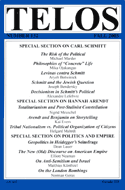On Tuesdays at the TELOSscope blog, we reach back into the archives and highlight an article whose critical insights continue to illuminate our thinking and challenge our assumptions. Today, Lev Marder looks at Kai Evers’s “The Holes of Oblivion: Arendt and Benjamin on Storytelling in the Age of Totalitarian Destruction,” from Telos 132 (Fall 2005).
 Totalitarianism drives people to silence, to defend their positions, to speak out, to cry out, and even to turn on themselves. Out of totalitarianism come some of the most incredible witness accounts, histories, and stories about these stories. Eventually theories about the theories of those stories, such as Kai Evers’s essay “The Holes of Oblivion: Arendt and Benjamin on Storytelling in the Age of Totalitarian Destruction,” emerge and peek through their holes. Juxtaposing Benjamin’s firm position that only silence could follow a catastrophe and Arendt’s rejection of this stance after accepting it, Evers questions whether or not storytelling is dead. Is it possible that the holes of oblivion designated by Arendt as the core of totalitarianism, where people and their traces seem to disappear, exist and totally efface?
Totalitarianism drives people to silence, to defend their positions, to speak out, to cry out, and even to turn on themselves. Out of totalitarianism come some of the most incredible witness accounts, histories, and stories about these stories. Eventually theories about the theories of those stories, such as Kai Evers’s essay “The Holes of Oblivion: Arendt and Benjamin on Storytelling in the Age of Totalitarian Destruction,” emerge and peek through their holes. Juxtaposing Benjamin’s firm position that only silence could follow a catastrophe and Arendt’s rejection of this stance after accepting it, Evers questions whether or not storytelling is dead. Is it possible that the holes of oblivion designated by Arendt as the core of totalitarianism, where people and their traces seem to disappear, exist and totally efface?
If storytelling is subsumed by totalitarianism, then destruction and violence, in Arendt’s terms, defeat politics and speech and perhaps even Benjamin’s own work. However, if storytelling can be saved from death, then not only do the holes of oblivion not exist, but the boundaries of politics that Arendt demarcates may lose their meaning. Bringing the tensions to light between Arendt’s early work, her later thought, and Benjamin’s position on storytelling, Evers maps the complex relation of storytelling to experience in the context of totalitarian destruction. What can be communicated? Turning the question on Arendt and Benjamin, Evers’s essay provokes us to turn a critical eye on the judges themselves. Narrowing the scope of the investigation from the question of what can words communicate to whose accounts can be trusted, and who should decide on the trustworthiness of these accounts, drives this essay to focus on the theorists and put them on the stand along with those claiming to be direct witnesses and victims. Thus bifurcating the locus of storytelling between the witnesses and theorists, Evers observes:
By privileging fearful anticipation, Arendt departs from Benjamin’s understanding of the storyteller. Benjamin’s concept led him to expect that the storyteller would return from the ranks of returning soldiers who would transform their lived experiences (Erlebnisse) into the communicable experience (Erfahrung) of storytelling. Their supposed silence and inability to fit their experience into the traditional pattern of storytelling marks for him the demise of storytelling itself. While Arendt encounters no comparable initial silence among the survivors returning from concentration camps, she nevertheless did not expect them to become the storytellers of their own experiences. On the contrary, storytelling that goes beyond the confines of immediate experience and seeks to communicate experience and the wisdom of past storytelling could only come from those, like herself, without direct experience of the horror of the concentration camps. By divorcing direct experience from storytelling, Arendt becomes the historian, for whom no personal experience of the events is required. (116-17)
In his article, Evers persistently interrogates what is necessary for taking the witness stand that Arendt assigns to herself. He not only asks if she herself can be the proper witness or be accused of an inconsistent story, but also brilliantly conveys how the possible responses would reflect on Arendt’s other theories.
Read the full version of Kai Evers’s “The Holes of Oblivion: Arendt and Benjamin on Storytelling in the Age of Totalitarian Destruction” at the TELOS Online website. If you are affiliated with an institution that is an online subscriber to Telos, you have free access to our complete online archive. If not, you can purchase 24-hour access to this and other Telos articles at the low rate of $5/article.








